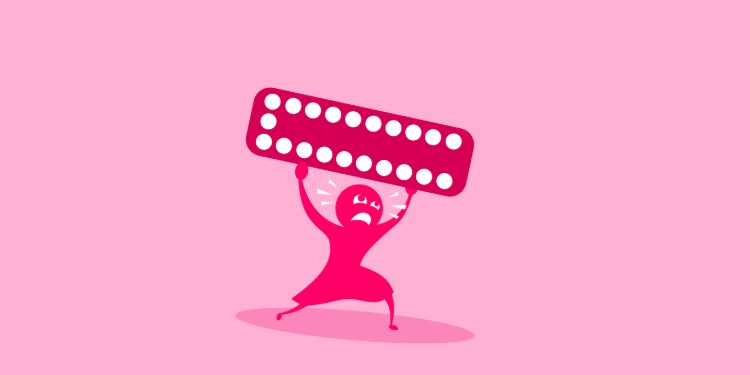In the last two posts, we explored the importance of birth control. As well as the uses and types of birth control. This week, I figured it would be great to delve more into the side effects.
Like with many other medications, side effects tend to occur because many of these birth control methods involve hormones. Hormones are chemicals which control many different functions in the body and they can cause problems when they are imbalanced. Also, because every woman in unique and we already have varying levels of these hormones in our bodies, each woman’s body will respond differently.
I’ll now go on to discuss some of the more common side effects associated with the use of birth control.
Breakthrough Bleeding
Unexpected vaginal bleeding is one of the most common birth control complaints. It is especially common in women who start taking the pill for the first time because it seems to take the body some time to get used to the synthetic hormones. Luckily this often goes away within several cycles.
While any hormonal birth control can cause irregular cycles, the Mirena IUD, Depo-Provera shot, and Nexplanon implant are the most common offenders because they are progestin-only methods. Without estrogen, cycles can become interrupted, intermittent, or even stop completely.
Blood Clots
Birth control pills can increase your chances of developing blood clots. But so does pregnancy and childbirth. This is more of a concern for women who smoke, are over age 35, or have high blood pressure and/or have a pre-existing heart disease.
Without any of these factors, the likelihood of blood clots reduces tremendously. This is why it’s very important that you discuss your previous medical history, as well as your lifestyle with your doctor as openly as possible when trying to make a decision. But if you are on the pill and experience any signs of a blood clot such as chest pain or a swollen leg, stop the pill immediately and see your doctor.
Acne
This is very important to many women because no one wants to have her beauty interrupted. The truth is that some birth control methods can exacerbate skin problems. The hormonal ups and downs over the course of your cycle are often the culprit. Even without birth control, many women notice more breakouts during their period. This is partly because of the increase in progesterone in the second half of your cycle. Also, some birth control ingredients can act as androgens, increasing the testosterone in your body, resulting in acne.
Some women on the other hand report clearer skin when using hormonal birth control so once again this may be dose or brand dependent.
Mood Problems / Depression Or Anxiety
Sometimes traditional hormonal birth control can cause mood changes in women. These side effects can range from occasional mood swings to major anxiety or depression. This risk is more in women who have a family history of mental health illness. This is thought to happen because of the effect hormones have on the all “feel-good” neurotransmitters in the brain.
While any hormonal birth control has the potential to make you depressed or anxious, the Norplant (an implant in your upper arm) has the worst track record, possibly because it is a progesterone-only device and further encourages an imbalance of hormones.
Weight Gain
This is another side effect that many women express concern about. The interesting thing is that no research has shown a direct link between (hormonal) birth control and weight gain. Estrogen is known to increase satiety by having an inhibitory effect on appetite, so having low estrogen can make you hungrier. Progesterone, on the other hand, stimulates your appetite, which helps explain those premenstrual cravings since the hormone is at its highest levels the two weeks between ovulation and your period.
Women on the Depo-Provera injection are twice as likely to become obese after three years as women on other forms of birth control, though the reason remains somewhat of a mystery. Recent studies have found no connection between the injection and calorie intake, fat consumption, or amount of exercise on body mass changes. Again, every woman’s body is different and will react to these hormonal preparations differently.
Heavy Periods
Although most hormonal birth control methods, given time, will lessen your flow or even make your periods disappear completely, there are some instances when it instead becomes worse. I can personally attest to this, having experienced this while. I had the copper IUD. It wasn’t like I started experiencing a downpour but I definitely had more bleeding than before I got the IUD inserted. This is because the copper in the IUCD alters the uterine lining and can cause it to shed more. The Mirena IUD on the other hand is the best option for reducing heavy flows. Many women who use the Mirena IUD have no period with it, and most other women have significantly lighter periods with it.
Reading through these side effects myself, I realise how scary they sound but this is just an honest report and it’s not meant to scare anyone. Remember, it’s always better to have as much information as possible to help you make the right decision.
If it’s any consolation, many side effects associated with birth control fade as your body adjusts to the new method. So if you recently started a new method and are experiencing effects you don’t like, it may be worth hanging in there for a few months to see if things get better. If you still don’t like that method after 6 months or so, don’t settle. Try something else! Sometimes all you need is a different dosage or formulation. The simple switch might be all it takes to find your perfect pill. Or the patch and get your whole body in tiptop shape
Also, always remember that none of these methods protect against sexually transmitted diseases.
